Content
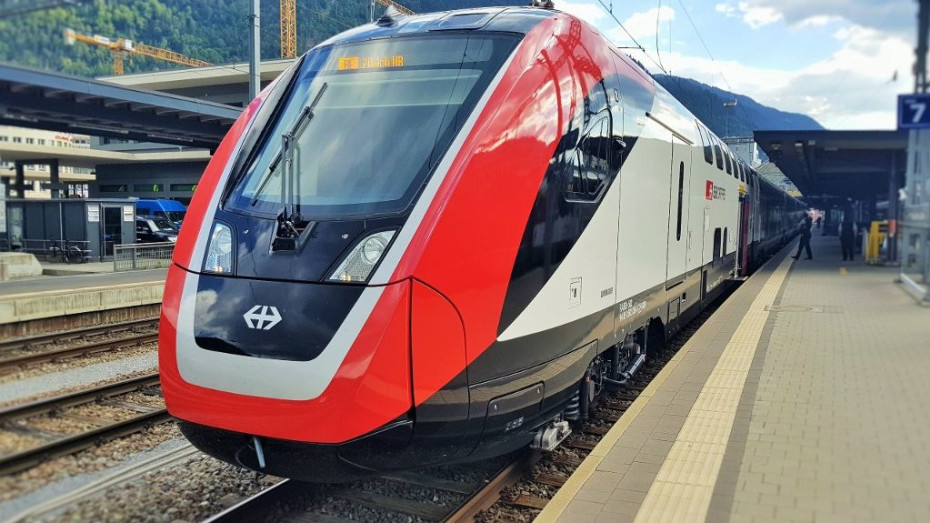
IC (Switzerland)
If you will be taking a IC express train service in Switzerland, this guide will tell you the key things you need to know about the different types of train.
Share
At a Glance
Travel Pass Supplement
Rail Pass Reservation Fees
Reservations
Available
Time of Day
Day
Catering
Food services available
Restaurant
Bar (sandwiches, snacks, salads)
Accessibility
Accessing the train
Wheelchair Spaces
Bikes Allowed
Train Specification
Attributes of the train
Has a Conductor
Country
Which country these trains operate in.
Switzerland
Travel Passes
Eurail
Interrail
Swiss Travel Pass
Saver Day Pass
On Board
First Class
Perks
Power Socket
The power sockets on this train are compatible with standard E.U. two point plugs.
Second Class
Perks
Power Socket
The power sockets on this train are compatible with standard E.U. two point plugs.
IC (Switzerland) travel guide:
In Switzerland IC (Intercity) is a train service and not a specific type of train.
Four types of train are now used by Swiss national rail operator SBB on its IC routes and services:
(1) Double deck IC 2000 trains - these are the older double deck trains which have been modernised.
(2) Newer double deck LD/Twindexx trains, which are gradually replacing the IC 2000 trains on some routes.
(3 Tilting single deck ICN trains.
(4) Single deck trains which use IV coaches.
Good to know info
ShowMeTheJourney has anticipated what questions are most often asked about travelling on these Swiss IC trains.
If you can't find the information you are seeking, you can ask a question and the AI enabled service will try to write an answer, telling you what you wish to know.
How fast does the train travel?
These trains have a theoretical top speed of 200 km/h (125 mph), and these trains can achieve this speed;
- through the Gotthard Base Tunnel
- on the higher speed line between Olten and Bern
Most of the routes that they follow have a top speed of 160 km/h (100 mph),
Are seats allocated when booking tickets?
No they are not, you have to proactively add a reservation when booking tickets and doing so incurs an additional cost.
At business hours, particularly in 2nd class, it is not unknown for the number passengers to exceed the quantity of seats.
Though when looking up a journey on the SBB website, it will show an occupancy indicator, so you can see how likely it will be that a specific departure will be busy.
So if 'high demand' is indicated, and you want to be sure of having a seat(s), adding a reservation to a booking is the way to go.
Can specific seats be selected from a seating plan?
When booking a reservation, the only booking options are:
- a seat(s) in the restaurant car;
- a seat(s) on the gangway / aisle
- the family compartment
- no preference.
There a relatively few family compartments on these trains, so if you would want to make use of one during a journey, making this reservation is highly recommended.
Note that it isn't possible to select :
- seats on the lower or upper deck (when available)
- forward facing seats
- seats adjacent to luggage racks
Do Eurail / InterRail / Swiss Travel Pass users need to make reservations?
No they are not mandatory, but are an option (though I have taken more than 20 journeys by Swiss IC trains when travelling with 1st class rail passes, without making reservations and never had a problem with finding available seats).
What catering is available on the train?
These trains all have a restaurant car which is available on most departures from 6.30am to 9pm to both 1st and 2nd class ticket holders.
Note that the restaurant service may not be available on all departures on a route, and this seems to be particularly the situation on the Basel ↔ Brig and Basel ↔ Interlaken routes.
Though something else to be aware of, is that on the double-deck trains, the seating area is on the upper decks.
The menu is reasonably priced by Swiss standards, so at meat times the service can be popular - hence reserving seats in the restaurant pre-boarding can be a good idea.
If all seats are taken in the restaurant, or if you would prefer to travel in seats outside the restaurant car, most of the items are available as a takeaway service - So in effect the restaurant doubles up as bar-bistro service.
On a few departures there will be no at seat service in the restaurant, but the bar/bistro takeaway service will still be available.
SBB does not offer an at-seat catering service in any part of these IC trains.
(Note that when travelling on the Zurich ↔ Bellinzona - Lugano route, an at seat service is available when travelling in 1st class on the alternative EC trains).
Is Wi-Fi available?
SBB does not offer a web portal for online connectivity, instead it offers boosted connectivity to local Wifi networks that the train will pass through.
Is a Quiet Coach available?
Only for travel in First Class.
What is the luggage policy?
There are no luggage rules for travel by these trains, though an option for transporting larger items of luggage between Swiss locations, is to use the Station-To-Station luggage service.
Are wheelchair spaces available?
Yes - the SBB guide to reduced mobility travel.
Can non-folding bicycles be taken on board?
Yes, but from March 21st to October 31st, spaces must be reserved pre-boarding when travelling on these routes:
- Zurich - Zug - Arth Goldau - Bellinzona – Lugano (route IC 2) - daily
- Basel - Olten - Luzern - Arth Goldau - Bellinzona – Lugano (route IC 21) - daily
- St Gallen - Winterthur - Zurich Flughafen - Zurich HB - Olten - Biel/Bienne - Neuchatel - Lausanne (route IC 5) - daily
- Zurich HB - Olten - Biel/Bienne - Neuchatel - Geneve - Geneve Aeroport (route IC 5) - daily
- any international express train for a journey within Switzerland.
On all other IC routes bike reservations are required from Friday to Sunday - and on summer holiday Mondays.
Can dogs be taken on board?
Yes - Small dogs with a height of up to 30cm can travel as hand luggage if they are placed in pet carrier, but if a dog is not in a carrier it requires either a ticket or a dog pass - whatever is cheaper.
The IC 2000 trains:
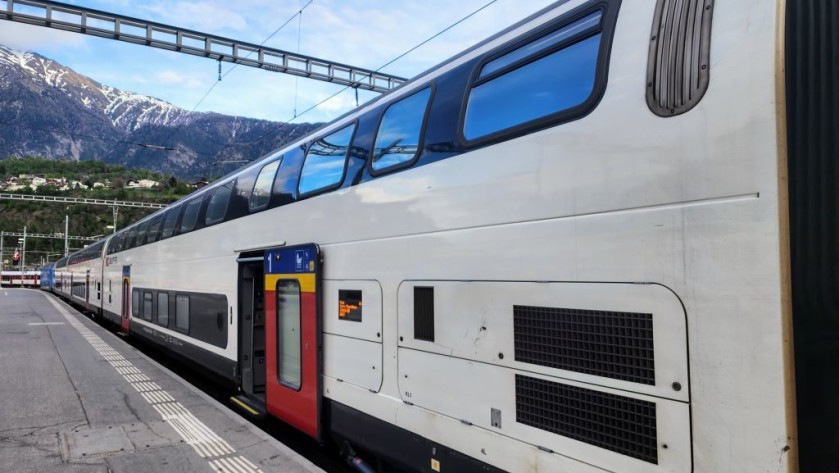
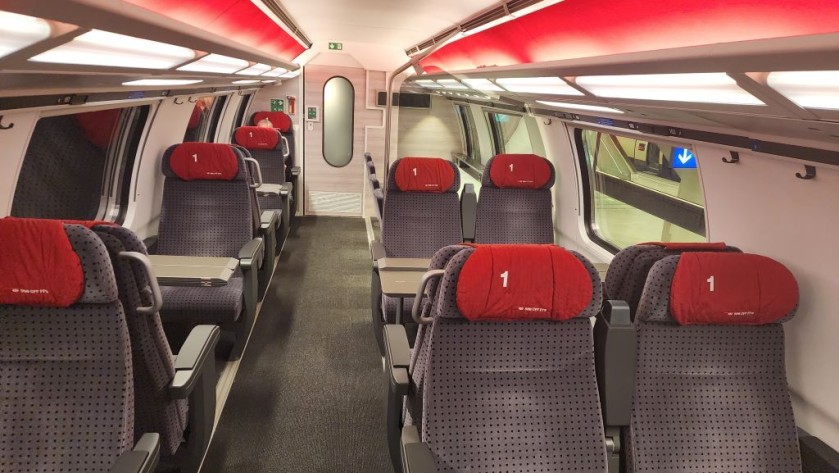
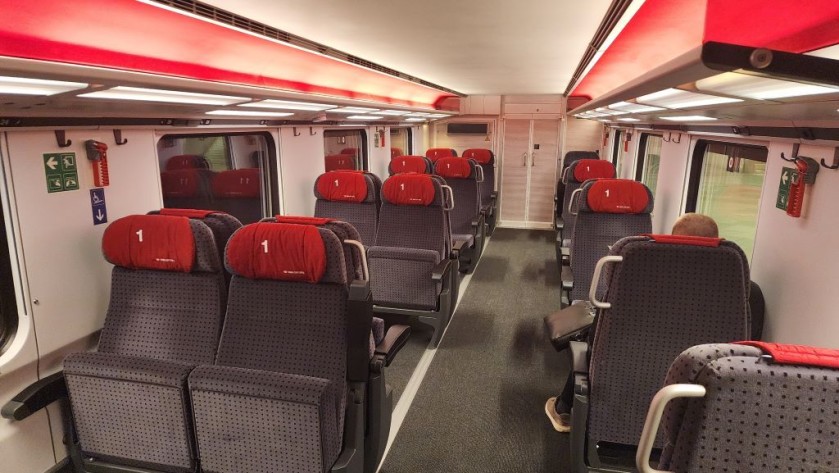
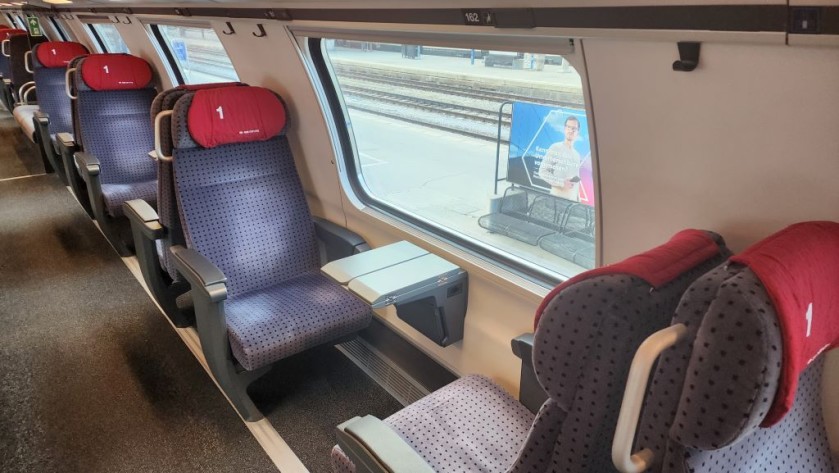
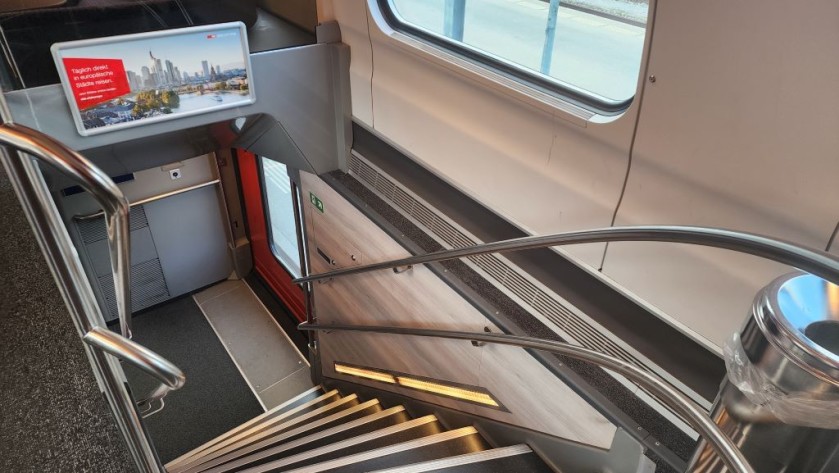
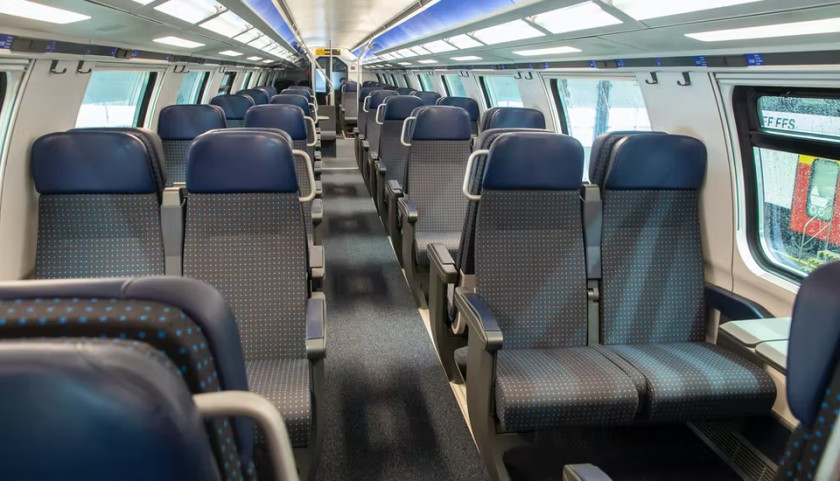
All of the routes taken by these double-deck trains have incredible scenic highlights, so an obvious advantage of being on the upper deck are the better opportunities to make the most of the views.
However, there are less obvious advantages of heading to the upper deck:
- it is easier to move through the train at the upper deck to seek out spare seats
- on the double deck trains, the restaurant is on the upper level.
The lower deck can feel more spacious as there’s more headroom; and if you have heavy luggage it obviously saves you the effort of heaving it upstairs.
There are luggage racks in the lower and upper deck seating saloons.
The toilets are also located on both decks.
On these trains all the power sockets, (which are only available in 1st class on the yet to be modernised trains, but can now be found in both classes on the refurbished trains) are only compatible with Swiss 3 pin plugs.
Whether these trains have or haven't been refurbished they have dedicated spaces for cycles, prams and wheelchairs.
Routes:
These IC 2000 double decks were the most common type of train used for Swiss IC services, they have been replaced by the Twindexx trains on some services, but they still operate on these routes:
IC 3: Basel - Zurich - Landquart - Chur (a few departures)
IC 6: Basel - Olten - Bern - Thun - Spiez - Visp - Brig (some departures)
IC 8: Romanshorn - Winterthur - Zurich Flughafen - Zurich HB - Bern - Thun - Spiez - Visp - Brig (all departures)
IC 61: Basel - Olten - Bern - Thun - Spiez - Interlaken West - Interlaken Ost (some departures)
On Board:
In First Class there are Quiet zones and Business zones; On the refurbished trains some Business Zone seats are at desks.
The trains which are yet to be refurbished can also appear to be a tad worn, they are arguably inferior to the externally similar, but newer, double-deck RE commuter trains that can now be found in some Swiss cities.
However, the modernised trains look very smart indeed!
And it looks as though the majority of the coaches have now been modernized!
The LD / Twindexx trains:
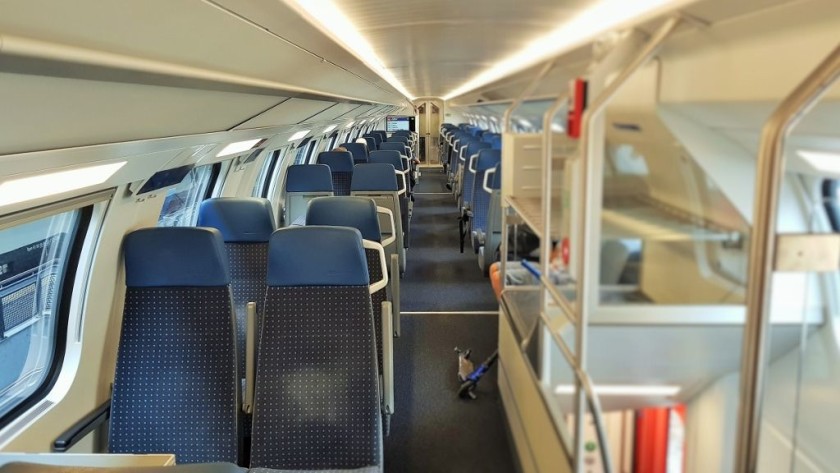
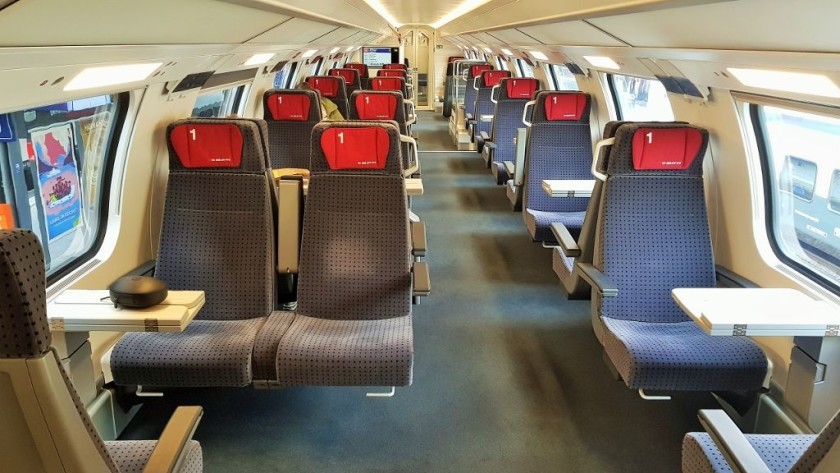
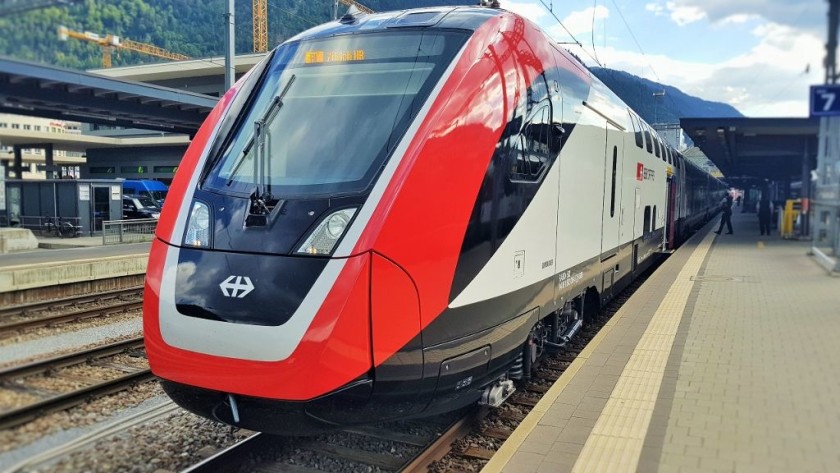
Like the older IC 2000 trains, if you travel on the upper deck:
- it is easier to move through the train at the upper deck to seek out spare seats
- the restaurant is at the upper level.
The lower deck can feel more spacious as there’s more headroom; and if you have heavy luggage it obviously saves you the effort of heaving it upstairs.
There are luggage racks in the lower and upper deck seating saloons.
The toilets are also located on both decks.
Routes:
These new LD/Twindexx trains are now used on these routes:
IC 1: St Gallen - Winterthur - Zurich Flughafen - Zurich HB - Bern - Fribourg - Lausanne - Geneve - Geneve Aeroport (now virtually all departures)
IC 3: Basel - Zurich HB - Landquart - Chur (some departures)
IC 21: Basel - Luzern - Bellinzona - Lugano (some departures)
On Board:
In comparison to the older double-decked Swiss IC 2000 trains, these new LD (Twindexx) trains have:
(1) Electronic info screens on board, which gives details of the route and list the details of the connecting departures available at the next station, which the train will be calling at.
(2) Power sockets available in 2nd class, as well as 1st class
(3) More wheelchair accessible compartments and toilets
(4) Toilets which have baby changing facilities
(5) A dedicated family car
(6) More space for prams/pushchairs/strollers
(7) More bike racks
As these trains represent a significant step-forward from the older IC 2000 trains, there is a dedicated guide to travelling by these trains; see below.
The ICN trains:
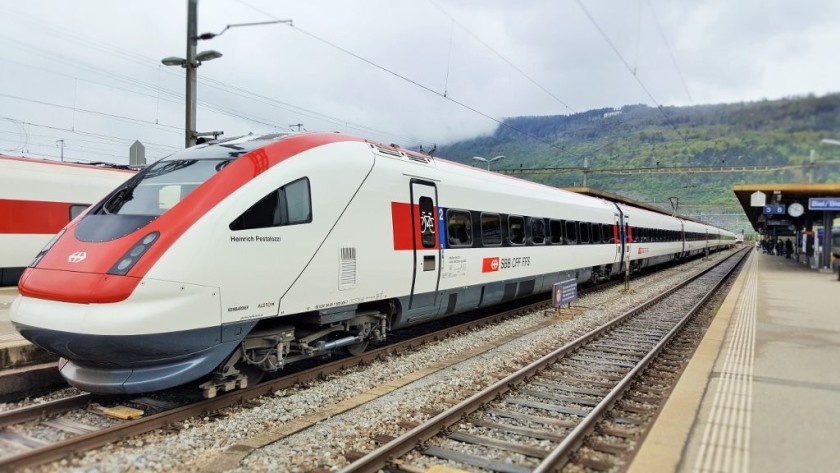
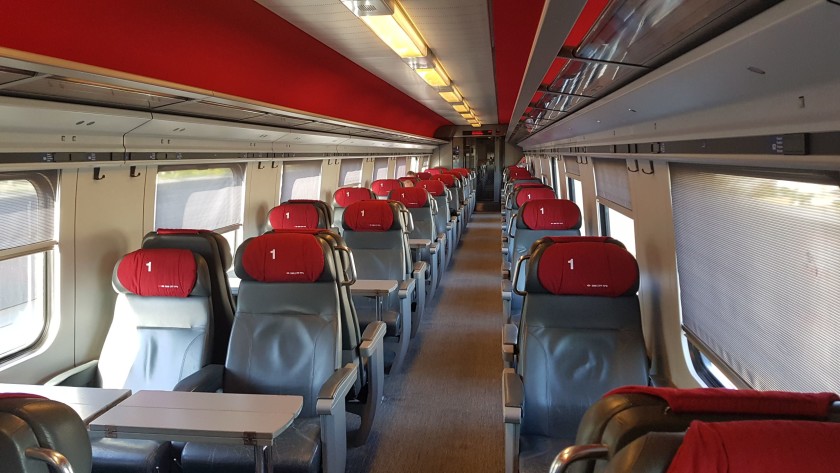
These trains operate on these routes:
IC 5:
St Gallen - Winterthur - Zurich Flughafen - Zurich HB - Olten - Biel/Bienne - Neuchatel - Geneve - Geneve Aeroport (all departures)
and
Rorschach - St Gallen - Winterthur - Zurich FlughafenZurich HB - Olten - Biel/Bienne - Neuchatel - Lausanne (all departures)
IC 51: Basel - Delémont - Moutiers - Biel/Bienne (some departures)
(connect in Biel for Geneve and Lausanne)
These single-deck tilting trains are quite different to the SBB trains used for other IC services.
They used to be specifically designated as ICN services on timetables; hence the specific guide to using these trains, which you can find below.
The single deck (IV) trains:
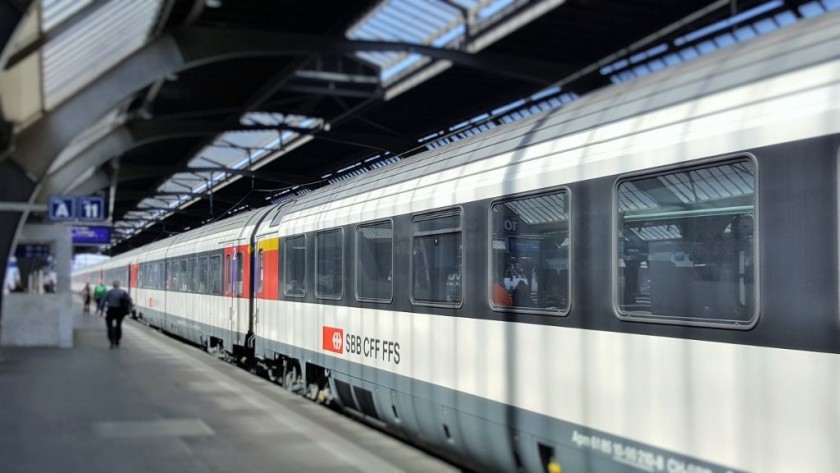
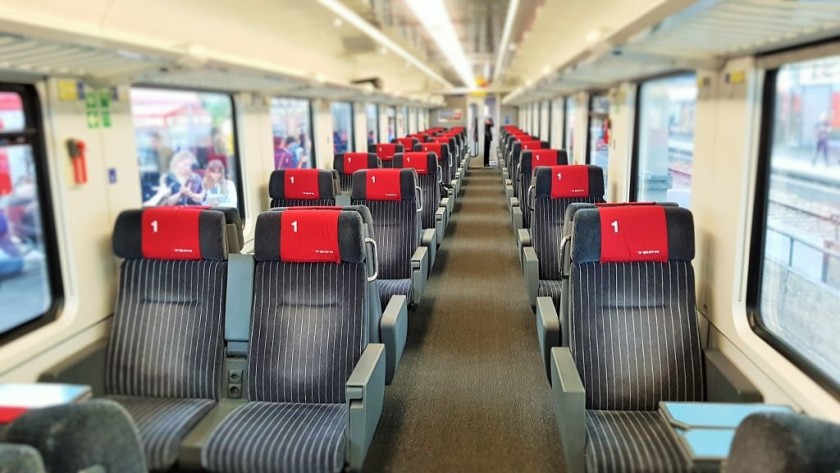
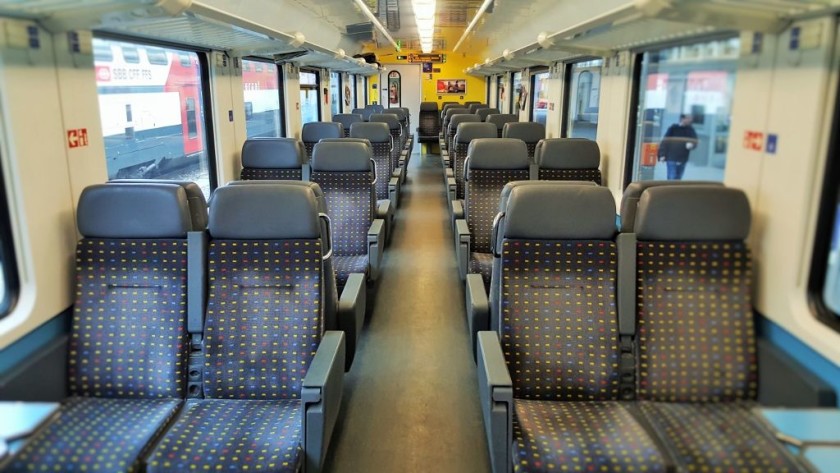
These single deck trains with the IV coaches are more common on these routes
IC 3: Basel - Zurich HB - Landquart - Chur (some departures)
IC 6: Basel - Olten - Bern - Thun - Spiez - Visp - Brig (some departures)
IC 61: Basel - Olten - Bern - Thun - Spiez - Interlaken West - Interlaken Ost (some departures)
These IV coaches are also used on the longer IR routes in Switzerland.
On Board:
The single deck trains/coaches are spacious, airy and comparatively comfortable; a big plus for scenic journeys is that the majority of the seats line up with the large windows on the single deck trains (all do in 1st class).
However, the single deck IC trains have no wheelchair access, though they do have bike racks, look for the symbol on the exterior of a coach; normally located in the first or last coach.
Some of the single deck coaches have Swiss 3-pin AND standard E.U. sockets.
Common features of all Swiss IC services:
What all of SBB's IC services share are:
- the provision of restaurant cars
- a trolley service of drinks/snacks
- a bistro/bar service
- a lack of Wi-fi provision*
- 'Quiet Zones' in which calls cannot be made in mobile phones - Look for the signs on the widows which feature phone with a line through it.
Don't make a call before checking that you are NOT in a Quiet Zone.
*= Swiss national rail operator SBB does not provide wi-fi on its trains in the conventional sense, meaning that passengers can't log on to a SBB portal for wi-fi.
Instead SBB has equipped some of the coaches on the IC trains with signal amplifiers, to enable enhanced connectivity with local mobile networks.
The coaches/cars equipped with this equipment have symbols by the doors; and SBB suggests that passengers who wish to access wi-fi during a journey, should travel in these coaches in order to access these 'hotspots'.
Reservations:
Seat reservations are optional on Swiss IC trains, but a big plus of the double deck trains is that they have a lot of seat.
Though if you're going to be travelling in 2nd class for more than an hour, during business hours, reservations can give peace of mind.
On the busiest services, seats may not be available when boarding, particularly at intermediate stations such as Bern, Lausanne and Olten.
If you haven’t reserved check the info screens on the platform which shows which zones the train will occupy when it arrives at a station.
Head for the zones furthest away from the entrance to the gleis (platform/track), fewer people will have headed to the far ends of each train, so you should increase your chances of finding a seat.
If you know that you'll want to have a meal in the on-board restaurant, you can reserve places pre-boarding.
Catering:
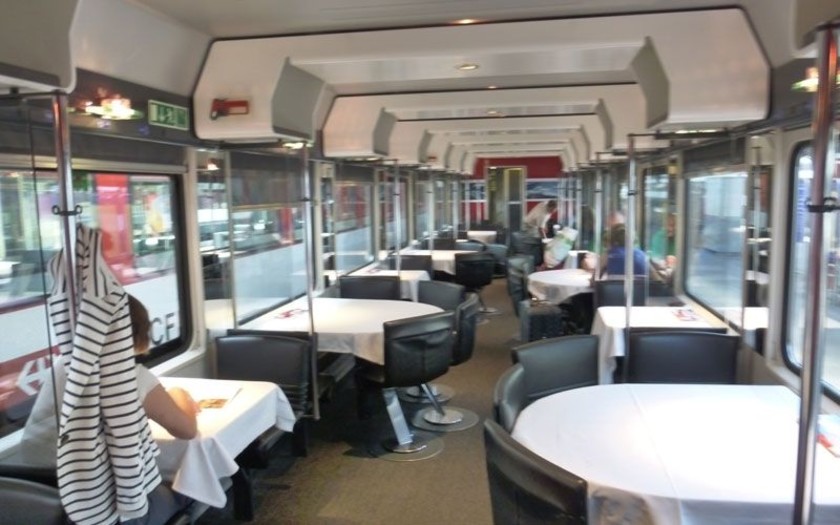
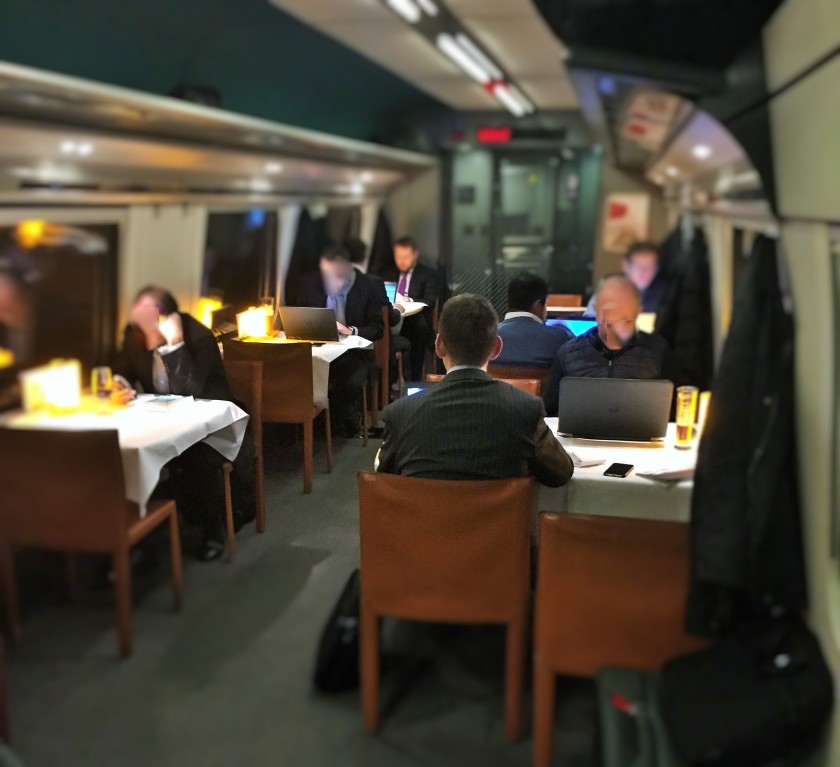
All Swiss IC trains have restaurant cars and they're popular at meal times, as prices aren't exponentially more expensive compared to standard restaurants.
If you want to have a meal head direct to the restaurant car when boarding and spend your journey in the car; it doesn't matter whether you have a 1st or 2nd class ticket.
Bicycles:
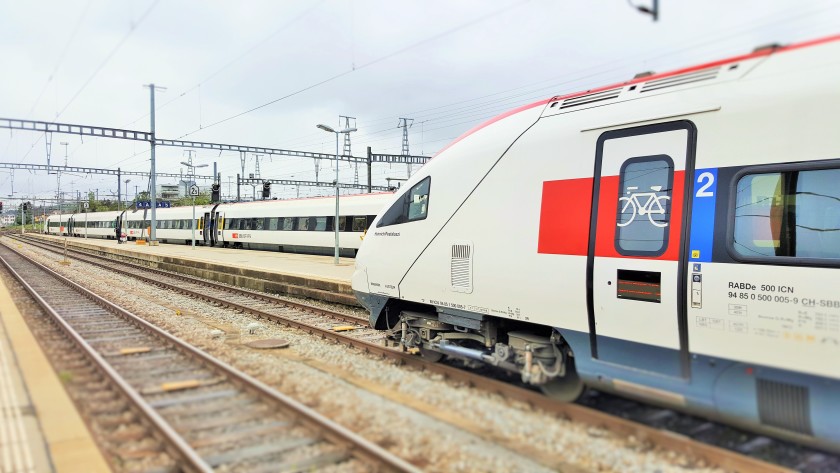
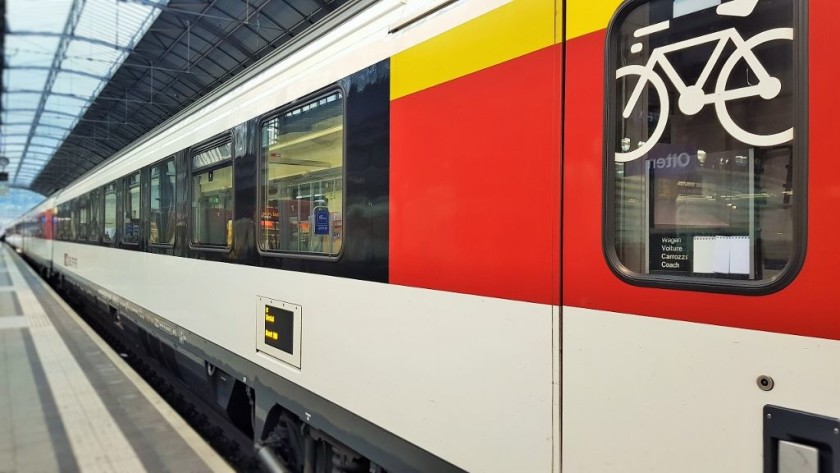
All of these trains used for IC services are fitted with bike storage spaces, which are indicated on the outsides of the train
Though as these trains can be up to 12 coaches long, being at the station early to work out where to wait for easy boarding is recommended.
On the SBB trains a day bike pass costs CH 14 and they can be booked online here.
The only other bike ticket available is a short-distance single journey ticket, which costs half the Adult fare.
This second version of ShowMeTheJourney is exciting and new, so we are genuinely thrilled that you are here and reading this, but we also need your help.
We’re striving not to let anything get in the way of providing the most useful service possible, hence a facility has been set up with DonorBox which can be used to support the running costs and make improvements.
Instead of advertising or paywalls, your financial support will make a positive difference to delivering an enhanced service, as there’s a lot of ideas which we want to make happen.
So if you have found the info provided here to be useful, please consider saying thank you.

This is one of more than 100 train travel guides available on ShowMeTheJourney, which will make it easier to take the train journeys you want or need to make. As always, all images were captured on trips taken by ShowMeTheJourney.





